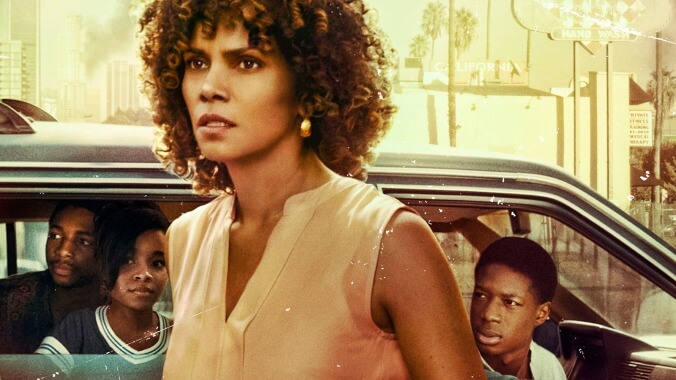Mixing constant clatter and spasmodic camera movements with a comic strip’s manic pace, Deniz Gamze Ergüven’s Kings at least earns points for avoiding the predictable pitfalls of a drama set against an episode of relatively recent American history. The backdrop is the Rodney King verdict and the Los Angeles riots of 1992—but more microcosmically, the anarchic South Central home of Millie Dunbar (Halle Berry, in what counts as her best role in many years), foster mother to more kids than the movie can keep track of. It’s a place of kitchen fires and hormones, which fuel Kings’ senseless energy. It all culminates in a shambolic finale that that literally intercuts tragedy and slapstick: one character dies slowly in a car lost in a fog straight out of silent film; two others flee after being handcuffed to a light pole in the parking lot of a looted strip mall. It’s possible to appreciate the film for recognizing both the horror and the absurdity in its subjects—racial animus, authoritarianism, disobedience—and for playing exclusively in those extreme registers, yet still come to the conclusion that it’s is all bark, no bite.
One might also conclude that it’s extremely silly. Ergüven, who made an impressive debut a few years ago with Mustang (though Kings was apparently written first), packs the film with distractions, vignettes, notes of abrupt anger: a Burger King manager trying to placate looters with trays of free food while psalmically reciting the fast-food options they will lose if his franchise is burned to the ground; a recreation of the 1991 death of Latasha Harlins, the Los Angeles teenager who was shot in the head by a store owner while trying to buy orange juice; a weird sex dream that Millie has about her her cranky, opera-loving alcoholic white neighbor, Obie (Daniel Craig). The character—who at one point finds himself babysitting Millie’s younger kids, and later becomes something like a love interest—slips around as much as Craig’s accent. He’s a kook one moment—wandering around his apartment naked, tossing furniture, firing off guns—and suave the next, his personality dictated by the movie’s own breakneck shifts in tone.
When Kings premiered last year at Toronto, the reception was disastrous, especially when compared to the critical acclaim that met Ergüven’s first film. But to consider this movie’s tone-deafness a cardinal sin, one has to presume that racism and violence are solemn affairs. The only thing Kings is really clear on is that’s about a battle between different forms of spontaneity and disorder. The good kind of chaos is obviously represented by Millie, whose bottomless selflessness operates exclusively on-the-fly—racing from one kid-related disaster to another, ad-libbing, delegating, and at one point slamming the brakes on her station wagon to grab a neighborhood boy straight off the street before the cops can pat him down. In contrast comes the chaos of LAPD, depicted in Kings as a desperate, almost Keystone-Kops-ian improvisation of authority, the officers’ uniforms soaked in flop sweat.
Presumably, the beating of Rodney King by four police officers is part of that, too. Though it’s not like anyone could accuse Kings of being too constrained by a thesis. Its idea of reality is patchwork, a lot of mixed signals and characters faced with the contradictions of their own behavior—exemplified by a dramatically obvious moment in which one of Millie’s older wards angrily stabs someone with a big piece of glass and then races off to get an ambulance. Cinematographer David Chizallet’s typically over-filtered, expressionistic camerawork reflects the theme, the highlights blooming and bleeding uncontrollably. Throw heaping portions of archival TV footage into the mix—not to mention a teenage love triangle subplot and the sight of Daniel Craig drunkenly leading little kids in a sing-along of “Say It Loud—I’m Black and I’m Proud”—and what you have is a mess.
One could even say that it’s almost as untidy as the real thing; regardless, it’s a cut above the facile messaging of something like Crash. (The Paul Haggis movie, not the David Cronenberg one.) In its highly combustable, confusing, angry environment, where everyone from parents to rioters to cops is just making it up as they go along, the only thing that seems to matter are the underlying drives, whether it’s goodheartedness or resentment. It’s what’s inside that counts—which, irony of ironies, is a completely superficial conclusion.

